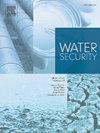电化学技术作为模块化自适应分散处理系统,为拉丁美洲制定水安全:见解和前景
IF 4.3
Q1 Earth and Planetary Sciences
引用次数: 0
摘要
分散式水/废水处理技术的出现是为了实现一个更好、更可持续的社会。人人享有清洁用水是联合国确定的到2030年要实现的一项主要目标。这种利用电化学技术进行分散治疗的概念将如何影响拉丁美洲国家的生活方式?本观点旨在确定这些地区的水/废水挑战,以及通过使用分散式电化学水处理技术克服这些挑战的可能机会。本文章由计算机程序翻译,如有差异,请以英文原文为准。
Electrochemical technologies as modular adaptative decentralized treatment systems to enact water security for Latin America: Insights and prospects
Decentralized water/wastewater treatment technologies have emerged to reach a better and more sustainable society. Access to clean water for all is a major goal identified by the United Nations to be reached by 2030. How would this concept of decentralized treatments using electrochemical technologies impact the way of living in Latin American countries? This perspective aims to identify the water/wastewater challenges in these regions, and the possible opportunities to overcome them by using decentralized electrochemical water treatment technologies.
求助全文
通过发布文献求助,成功后即可免费获取论文全文。
去求助
来源期刊

Water Security
Earth and Planetary Sciences-Oceanography
CiteScore
8.50
自引率
0.00%
发文量
17
期刊介绍:
Water Security aims to publish papers that contribute to a better understanding of the economic, social, biophysical, technological, and institutional influencers of current and future global water security. At the same time the journal intends to stimulate debate, backed by science, with strong interdisciplinary connections. The goal is to publish concise and timely reviews and synthesis articles about research covering the following elements of water security: -Shortage- Flooding- Governance- Health and Sanitation
 求助内容:
求助内容: 应助结果提醒方式:
应助结果提醒方式:


